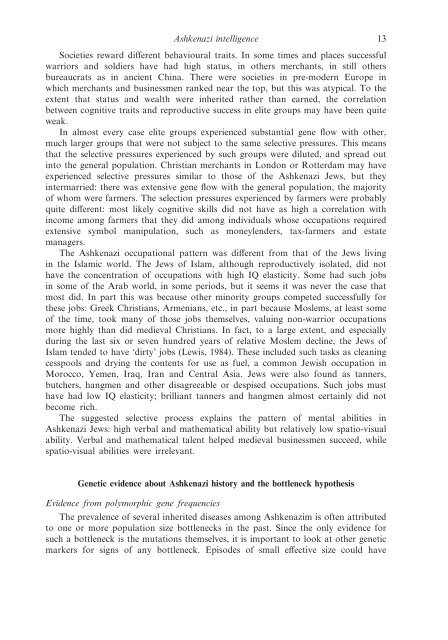natural history of ashkenazi intelligence - Henry C Harpending ...
natural history of ashkenazi intelligence - Henry C Harpending ...
natural history of ashkenazi intelligence - Henry C Harpending ...
Create successful ePaper yourself
Turn your PDF publications into a flip-book with our unique Google optimized e-Paper software.
Ashkenazi <strong>intelligence</strong> 13<br />
Societies reward different behavioural traits. In some times and places successful<br />
warriors and soldiers have had high status, in others merchants, in still others<br />
bureaucrats as in ancient China. There were societies in pre-modern Europe in<br />
which merchants and businessmen ranked near the top, but this was atypical. To the<br />
extent that status and wealth were inherited rather than earned, the correlation<br />
between cognitive traits and reproductive success in elite groups may have been quite<br />
weak.<br />
In almost every case elite groups experienced substantial gene flow with other,<br />
much larger groups that were not subject to the same selective pressures. This means<br />
that the selective pressures experienced by such groups were diluted, and spread out<br />
into the general population. Christian merchants in London or Rotterdam may have<br />
experienced selective pressures similar to those <strong>of</strong> the Ashkenazi Jews, but they<br />
intermarried: there was extensive gene flow with the general population, the majority<br />
<strong>of</strong> whom were farmers. The selection pressures experienced by farmers were probably<br />
quite different: most likely cognitive skills did not have as high a correlation with<br />
income among farmers that they did among individuals whose occupations required<br />
extensive symbol manipulation, such as moneylenders, tax-farmers and estate<br />
managers.<br />
The Ashkenazi occupational pattern was different from that <strong>of</strong> the Jews living<br />
in the Islamic world. The Jews <strong>of</strong> Islam, although reproductively isolated, did not<br />
have the concentration <strong>of</strong> occupations with high IQ elasticity. Some had such jobs<br />
in some <strong>of</strong> the Arab world, in some periods, but it seems it was never the case that<br />
most did. In part this was because other minority groups competed successfully for<br />
these jobs: Greek Christians, Armenians, etc., in part because Moslems, at least some<br />
<strong>of</strong> the time, took many <strong>of</strong> those jobs themselves, valuing non-warrior occupations<br />
more highly than did medieval Christians. In fact, to a large extent, and especially<br />
during the last six or seven hundred years <strong>of</strong> relative Moslem decline, the Jews <strong>of</strong><br />
Islam tended to have ‘dirty’ jobs (Lewis, 1984). These included such tasks as cleaning<br />
cesspools and drying the contents for use as fuel, a common Jewish occupation in<br />
Morocco, Yemen, Iraq, Iran and Central Asia. Jews were also found as tanners,<br />
butchers, hangmen and other disagreeable or despised occupations. Such jobs must<br />
have had low IQ elasticity; brilliant tanners and hangmen almost certainly did not<br />
become rich.<br />
The suggested selective process explains the pattern <strong>of</strong> mental abilities in<br />
Ashkenazi Jews: high verbal and mathematical ability but relatively low spatio-visual<br />
ability. Verbal and mathematical talent helped medieval businessmen succeed, while<br />
spatio-visual abilities were irrelevant.<br />
Genetic evidence about Ashkenazi <strong>history</strong> and the bottleneck hypothesis<br />
Evidence from polymorphic gene frequencies<br />
The prevalence <strong>of</strong> several inherited diseases among Ashkenazim is <strong>of</strong>ten attributed<br />
to one or more population size bottlenecks in the past. Since the only evidence for<br />
such a bottleneck is the mutations themselves, it is important to look at other genetic<br />
markers for signs <strong>of</strong> any bottleneck. Episodes <strong>of</strong> small effective size could have


